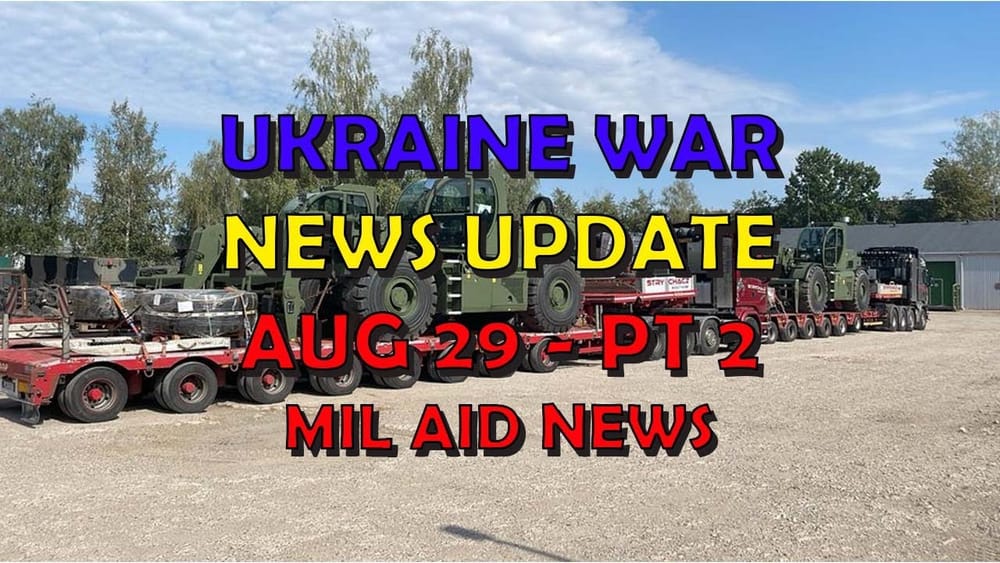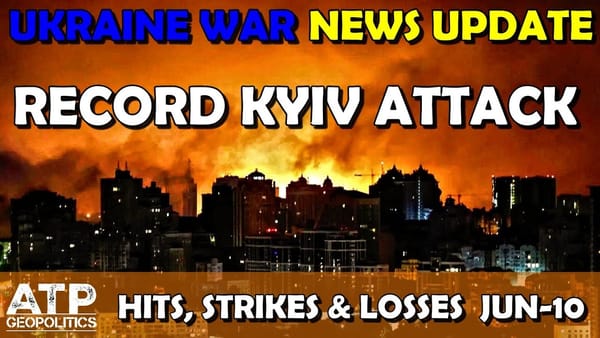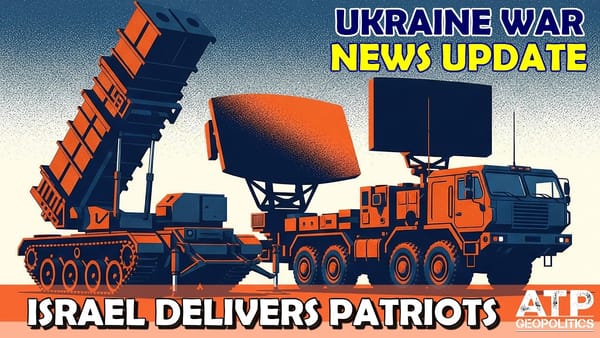Ukraine War Update NEWS: Military Aid News
Table of Contents 📖
"And I would like that to be heard on every single TV station and I would like that to be heard on every single news bulletin in the world. Gabriele Slensbergis is brilliant."
Hello Team
🎦 00:00-00:13⏩
Jonathan welcomes viewers to another ATP Geopolitics video, a Ukraine War News Update focused on military aid. He plans to release a two-day roundup on geopolitics the next day.
Debate over Arming Ukraine and Path to Peace
🎦 00:13-05:40⏩
Jonathan discusses the debate surrounding the best path to peace in Ukraine, highlighting arguments for and against providing Ukraine with the weaponry needed to achieve a decisive victory.
- Finnish President Alexander Stubb argues that arming Ukraine is the most efficient path to peace, leading to a quicker end to the war with fewer lives lost. He emphasizes that Ukraine's ability to create instability within Russia is strategically advantageous.
- Jonathan notes Finland's quiet but significant military support for Ukraine, including the provision of Soviet-era self-propelled guns like the PSH 74.
- Jonathan revisits General Breedlove's statement that the current level of U.S. support will lead to Ukraine's defeat. He criticizes the Biden administration's cautious approach to military aid, suggesting it stems from uncertainty surrounding the November elections and the potential for a Trump victory to halt aid entirely.
- Jonathan analyses the potential impact of the upcoming U.S. elections on aid to Ukraine, acknowledging bipartisan support but expressing concern over the influence of the anti-escalation faction within the Biden administration.
- Ukrainian Foreign Minister Dmytro Kuleba urges allies to lift restrictions on long-range strikes into Russia and seeks NATO support for Poland to intercept Russian missiles over Ukraine, arguing this would not make them parties to the war.
- Jonathan highlights Kuleba's strong stance against the anti-escalation rationale employed by the Biden administration, quoting him as saying, "If decisions are made, Ukraine is successful on the ground. If not, don't blame Ukraine, blame yourself."
- Jonathan discusses the Netherlands' clarification that they did not restrict the use of F-16s provided to Ukraine, implying they could be used for strikes within Russia in accordance with the laws of war.
- Czech President Petr Pavel emphasizes Ukraine's right to decide how to use Western weapons, including F-16s, citing Article 51 of the UN Charter, which allows for self-defence against aggression.
- Lithuanian Foreign Minister Gabrielius Landsbergis criticizes the West's reluctance to provide Ukraine with long-range strike capabilities, arguing that it protects Russian bombers more than Ukrainian civilians.
- Landsbergis questions the West's commitment to Ukraine, highlighting the delayed delivery of promised aid, including Patriot batteries and ammunition packages.
- Jonathan expresses admiration for Landsbergis's blunt assessment, calling for his message to be broadcast widely.
EU Military Aid and Support for Ukraine
🎦 08:51-15:24⏩
Jonathan shifts focus to the European Union's (EU) role in providing military aid and supporting Ukraine:
- The EU pledges to expedite military and energy equipment deliveries to Ukraine following a plea from Dmytro Kuleba.
- Jonathan notes Kuleba's request for the EU to deliver on its promise of providing Patriot missile systems, acknowledging positive signs but no concrete action.
- News breaks of a new Ukrainian ballistic missile, possibly named the "Grin 2," with a range of 600-700 kilometers, capable of striking Moscow. Jonathan recalls a previous discussion about a potential target in Elektrostal.
- Jonathan reiterates Kuleba's call for countries to deliver promised Patriot systems.
- Lithuania announces a new military aid package for Ukraine, including loaders, anti-drone systems, folding beds, and other essential supplies, emphasizing their ongoing support. Jonathan praises Lithuania's contributions despite being a small country.
- Spain announces a new aid package for Ukraine, consisting of seven generators worth €360,000, intended to support critical infrastructure impacted by Russian attacks. Jonathan thanks Spain for its contribution.
- Jonathan revisits the discussion about the Finnish Grodzica self-propelled guns.
Advancements in Drone Technology and the Evolving Battlefield
🎦 11:07-13:41⏩
Jonathan discusses the evolving nature of warfare, highlighting advancements in drone technology:
- Jonathan analyzes an image of a fixed-wing drone equipped with six bombs, marveling at the increasing role of unmanned systems in warfare. He compares this to larger, manned bombers and acknowledges the limitations imposed by the contested airspace in Ukraine, making the deployment of aircraft like the A-10 Warthog unlikely.
- Jonathan ponders the potential of smaller, more numerous drones carrying smaller but more potent bombs as a way to overcome the lack of air superiority. He suggests investing in research and development for lighter yet more effective explosives to be deployed by these drones.
EU Considers Training Ukrainian Troops Within Ukraine
🎦 13:41-15:24⏩
Jonathan discusses the EU's internal debate about providing military training to Ukrainian troops within Ukraine:
- The EU is considering providing training to Ukrainian troops within Ukraine, a move supported by France and Lithuania but opposed by Germany due to fears of escalation with Russia.
- Jonathan reports that the EU acknowledges the logistical advantages of training within Ukraine but expresses concerns about the safety of Western trainers.
- The majority of EU training for Ukrainian troops has taken place in Poland and Germany, with around 60,000 Ukrainians having received training by the end of summer 2024.
- The EU External Action Service recommends extending the training mission's mandate for two years, until November 15, 2026, and suggests exploring training options closer to Ukraine's borders.
- Jonathan mentions Josep Borrell, the EU's foreign policy chief, advocating for the lifting of restrictions on Ukrainian strikes into Russia.
Lockheed Martin's Potential Role in F-16 Support and US Ammunition Production
🎦 15:24-17:05⏩
Jonathan discusses Lockheed Martin's potential role in supporting Ukraine's F-16 fleet and updates on US ammunition production:
- Lockheed Martin has not yet been contracted by the US Department of Defense to support Ukraine's F-16 fighter jets, despite offering training and maintenance capabilities in Romania and Poland.
- Jonathan questions the lack of urgency in involving Lockheed Martin, speculating about potential reasons and whether their expertise could have improved the efficiency of F-16 support.
- An ammunition plant in Scranton, Pennsylvania, has increased production of 155mm artillery shells by 50%, many of which are destined for Ukraine. Jonathan acknowledges the efforts to address ammunition shortages, highlighting increased production in both the US and Europe.
Russia's Recruitment Challenges and Internal Pressures
🎦 17:05-21:11⏩
Jonathan turns his attention to Russia, discussing their recruitment challenges and the internal pressures they face:
- Moscow police are being offered a bounty of 50,000 rubles ($558) for each person they persuade to sign up for military service, targeting immigrants, homeless people, and individuals under police supervision.
- Jonathan expresses skepticism about the "persuasion" tactics likely to be employed by Russia's notoriously corrupt police force.
- The bounty system, while potentially boosting police salaries, raises concerns about increased corruption and the potential for false arrests to coerce individuals into military service.
- Jonathan analyzes a report highlighting Russia's struggles to find new recruits amidst heavy losses in Ukraine. The use of bounties is seen as a sign of increasing desperation.
- Jonathan questions whether such measures reflect a healthy army and society, suggesting they point towards desperation within Russia.
- Russia is reportedly withdrawing military contractors, likely from the Wagner Group or similar organizations, from Burkina Faso to bolster defenses in the Kursk and Belgorod oblasts against Ukrainian counteroffensives.
- Jonathan interprets this withdrawal as further evidence of Russia's increasingly precarious military situation.
Concluding Thoughts: Desperation and the Dangerous Game of Military Chicken
🎦 21:11-21:35⏩
Jonathan concludes the update by reflecting on the desperation of both sides and the potential consequences:
- Jonathan concludes that Russia's recent actions, including the bounty system and withdrawal of contractors, suggest a state of desperation, even though Ukraine is also in dire need of resources. He posits that Russia may have a higher tolerance for desperation.
- He compares the situation to a "dangerous game of military chicken," questioning which side will break first under the immense pressure, with the Ukrainian counteroffensive towards Tokmak and the Russian offensive in the direction of Kupiansk/Lyman being key areas to watch.
Wrap up
🎦 21:35-21:54⏩
Jonathan signs off, reflecting on the video and his upcoming content schedule:
- Jonathan expresses hope that the video was informative and contemplates immediately recording his geopolitics analysis, scheduling it for release overnight.
- He acknowledges the importance of timely news coverage and thanks viewers for watching.



